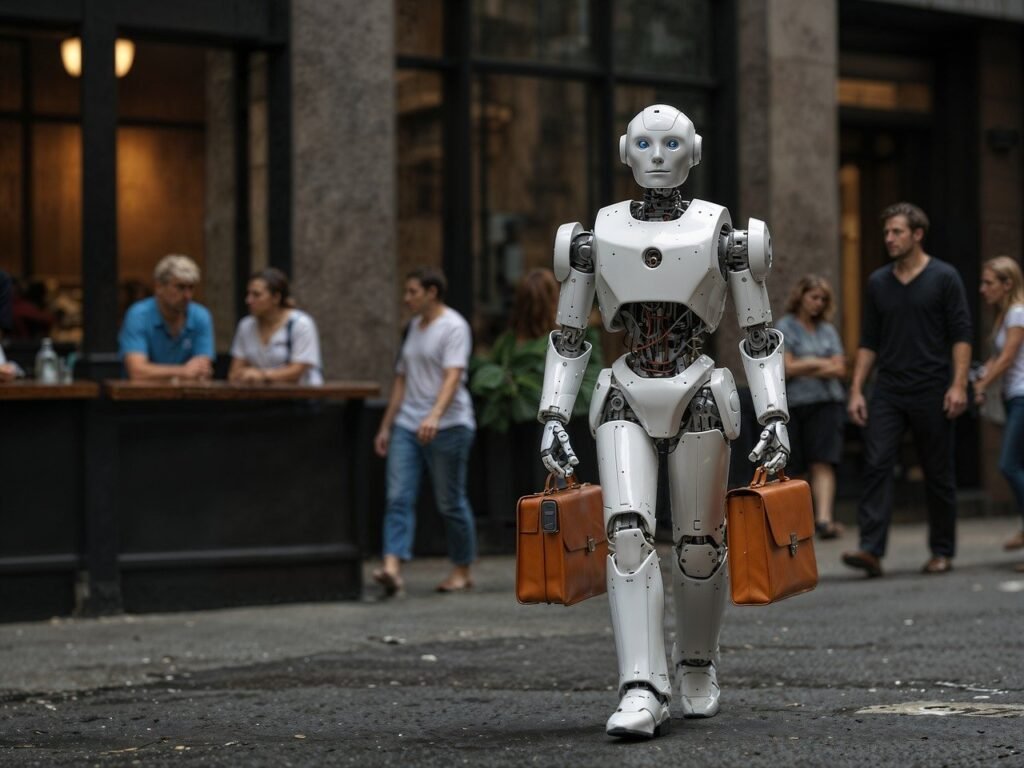The Future Economy and New Jobs
Introduction
Over the years, the world economy has been radically changed by rapid technological changes, globalization, and shifting demographics with changing social values. From this perspective, it is easily said that for many years into the future, the globe will continue to keep abreast with continuous change and face new challenges and opportunities. Among the key features that shape the future character of work, there is an impact on jobs and work patterns. New industries are sprouting, traditional occupations are being taken over, and the nature of work itself is changing. In this essay, we consider what the future economy might look like, new jobs that may emerge, and what that portends for workers, employers, and policymakers.
The Forces Shaping the Future Economy
There are several critical drivers of change currently pushing the global economy into a new era. Of these, perhaps the most important is technological innovation. Automation, AI, machine learning, and robotics are transforming entire industries, making processes much more efficient and allowing enterprise growth on unprecedented levels. These technologies will not only alter how goods and services will be produced but also the type of jobs that will surface in the future.
Apart from that, globalization is another critical determinant of the future economy. Due to the increasing supply chain interdependency and international expansion of businesses, it will be a greater need for workers who can work across cultures, are proficient in a language, and possess global business acumen. In addition to this, the ongoing digital shift reduces the importance of geography, which will enable workers from different parts of the world to work in tandem in real time.
Another important driver within the future economy involves shifting demographics. That is to say, the global population is aging, whereby an increasingly higher percentage comprises people over the age of 65. The result is going to be a very dramatic impact on the labour markets, while increasingly older populations retire or are less actively participating in the workforce. In return, younger generations, partly comprised by millennials and Generation Z, start being more actively involved in the workforce, although they also come with different expectations and values. Changing demographics translate into changes in work culture, workplace dynamics, and even the nature of jobs that will be in demand.
Last but not least, societal values and priorities are shifting. Increasingly, considerations about environmental sustainability, social justice, and corporate responsibility are brought into the forefront. As these types of values increase, so too do those industries and companies which create job openings towards this end. Of all these, green jobs would definitely be one of the fastest-growing occupations while the world is trying to move toward sustainability.
Impact of Automation and Artificial Intelligence on Jobs

The greatest technological shift that makes a huge difference to the future of the economy is automation. Automation refers to machines, software, and other technologies performing tasks previously done by humans. The most evident among all these is AI, which learns from data and improves as time progresses to perform tasks that require cognitive capabilities.
While automation increases efficiency and cuts costs, it also causes a serious threat to the conventional job. Many routine, manual, and repetitive tasks run the risk of being automated. For example, manufacturing, warehousing, and customer service jobs have already begun getting replaced by robots and AI-powered systems. In transportation, self-driving vehicles have the potential to erase millions of truck drivers’, delivery personnel’s, and taxi drivers’ jobs.
But automation is not just about job losses; openings due to automation also arise. For instance, the development, maintenance, and improvement of AI systems require highly trained professionals: data scientists, machine learning engineers, and robotics experts are sought after. And their demand will keep on growing as automation continues to advance. Moreover, industries applying automation will also require a human workforce to oversee or regulate the technology so that everything is in order and within acceptable levels of ethics.
While some jobs will disappear, others will evolve. Examples are that some health workers might utilize AI to diagnose diseases more precisely and at an early stage and even work out treatment plans. Similarly, teachers can use AI-powered tools to enrich the learning experience of their students by offering personalized education to each one. On the other hand, automation will not replace workers but supplement their skills in enabling them to shift their attention to higher and more abstract tasks and decisions.
Creation of New Industries and Employment Opportunities
With every evolution of technology, new industries and job categories emerge. Most of these emerging industries are related to technological innovation, sustainability, and digital transformation. Here are a few important key sectors where the new job creation is going to blossom in the near future.
Green Jobs and Sustainability: The creation of green jobs is being promoted by the global shift toward environmental sustainability. Green jobs are all about reducing environmental impact and making other industries more sustainable. This includes, but is not limited to, such jobs as renewable energy positions, including solar and wind energy technicians; environmental consultants; sustainability officers; and carbon capture and storage experts
.And this demand is only set to increase with governments and companies continuing to raise investments in clean energy and climate change mitigation. Besides, a host of other sectors-like construction, agriculture, and manufacturing-will require professionals who can actually weave in sustainability into their operations.
Tech-Driven Jobs: AI, robotics, and machine learning have opened new avenues in the field of tech-driven jobs. Data science, cybersecurity, software development, and cloud computing are areas that will continue to see demand. Business operations are digitizing, and with the adoption of new technologies, there is a growing need for experts who can design, implement, and manage such systems.
Health and Biotechnology: The jobs in the medical field will also grow as there are more developments in biotechnology, health care, gene therapy, personalized medicine, and telemedicine. The graying of the world’s population will also be adding to health care needs and the demand for doctors and nurses and other health professionals who specialize in geriatric care, home health care, and medical technology.
Besides, the COVID-19 pandemic accelerated the need for innovations in healthcare delivery and catalyzed the growth of telemedicine, remote patient monitoring, and digital health solutions. These will remain growth areas and open up new opportunities for professionals with expertise in both healthcare and technology.
Remote Work and Digital Collaboration: The COVID-19 pandemic has drastically accelerated this trend, and many organizations have found that remote work is no less productive than commuting to the facilities. Therefore, remote work will be an important part of the economy in the future.
New roles are being created in digital collaboration and virtual office management, including such titles as remote team coordinator, virtual meeting facilitator, and digital project manager. With companies continuing to move towards working remotely, businesses will also need experts in cybersecurity, data management, and cloud computing services to keep their systems safe and operational.
Creative and Content Creation: Since much importance is given to digital media and ways of consuming content, the requirement for creative professionals has taken an upward graph. Basically, for as long as businesses seek newer ways of talking with their customers, there is a demand for those skilled at creating engaging content that manages social media, video producing, and digital marketing.
Furthermore, the development of virtual and augmented reality opens new opportunities for specialists who can provide consumers with a new level of immersion. Already, these technologies are involved in such industries as gaming and entertainment, education, and real estate, and their potential for growth is immense.
Future Work Force Skills
Since the economy is continuously changing, the required ability or skill also undergoes a number of changes. While the technical skills will still be very essential, soft skills will be even more in demand, as automation takes over routine ones. The workforce in the future will need both hard and soft skills to remain competitive in this shifting economy.
Technical Skills: The uprising of AI, Machine Learning, and Automation will also demand that workers have technical skills related to programming, data analysis, and robotics. With more industries getting digitized, working knowledge of digital tools and platforms will be the essence for the workforce.
Problem-Solving and Critical Thinking: More routine tasks will be automated, and the worker can then devote more time to thinking through higher-order tasks, such as problem-solving and critical thinking. The person who can analyze a complex problem, make a decision, and adapt to new situations will be significant.
Emotional Intelligence and Communication: While machines would have performed a lot of tasks, there is no possible way to do away with human emotions, empathy, and communication. In this respect, emotional intelligence and the way people communicate will be highly valued. The ability to work in cooperation, being able to manage teams and complex social dynamics will be a feature that is valuable in diversified and interlinked workplaces.
Ability to Adapt and Lifetime Learning: This rapid rate of change in technology faces workers with the need for adaptability and a commitment to lifelong learning. Future workers will have to be willing to learn and adapt quickly and constantly to new technologies and changing work environments.

